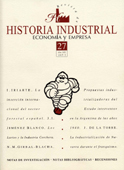Institutions, businessmen and market: the industrialisation of Navarre during Franco’s regime
Keywords:
Institutions, Entrepreneurs, Industry, NavarreAbstract
From a dual perspective of the regional economic development and the theory of economic planning, this article tackles an analysis of the factors that explain why a territory of reduced dimensions and scarce demography industrialised during Franco’s dictatorship. In Navarre the institutional intervention gave visibility to the impulse of the market forces. Foreign and native businessmen, business opportunities, fiscal advantages, and a strategic location between some of Spain’s principal manufacturing centres, contributed to this region’s profound process of social and economic change. The manufacturing model followed the pattern created by the car industry and metal industry. This success exhibits a striking difference in comparison to the relative failure of the development poles created by López Rodó’s Commisariat.Downloads
Downloads
Published
How to Cite
Issue
Section
License
The author assigns all rights to the publisher. Creative Commons
The author who publishes in this journal agrees to the following terms:
- The author assigns all intellectual property rights exclusively to the publisher for the entire duration of the applicable intellectual property rights.
- The publisher will distribute the texts under the Creative Commons Attribution License, which allows others to share the work, provided that they acknowledge the authorship, its initial publication in this journal, and the conditions of the license.





